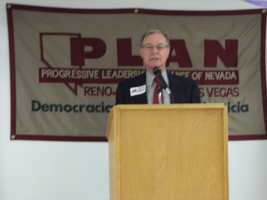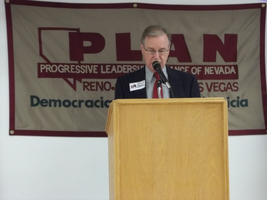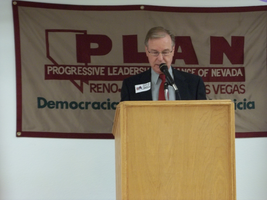Search the Special Collections and Archives Portal
Search Results

David Parks attends Equality Won! Day celebration at Equality Nevada Community Center, 708 South Sixth Street, Las Vegas, Nevada: digital image
Date
2011-10-01
Archival Collection
Description
From the Dennis McBride Photograph Collection (PH-00263) -- LGBTQ+ events and organizations in Las Vegas, Nevada -- Digital images file. Notes from the donor, Dennis McBride: Equality Won! Day was a celebration of the successful passage of transgender-inclusive legislation at the Nevada State Legislature during the 2011 session. Individuals identified by the donor, Dennis McBride: David Parks [Nevada State Senator, District 7, Democrat (gay)]
Image

David Parks attends Equality Won! Day celebration at Equality Nevada Community Center, 708 South Sixth Street, Las Vegas, Nevada: digital image
Date
2011-10-01
Archival Collection
Description
From the Dennis McBride Photograph Collection (PH-00263) -- LGBTQ+ events and organizations in Las Vegas, Nevada -- Digital images file. Notes from the donor, Dennis McBride: Equality Won! Day was a celebration of the successful passage of transgender-inclusive legislation at the Nevada State Legislature during the 2011 session. Individuals identified by the donor, Dennis McBride: David Parks [Nevada State Senator, District 7, Democrat (gay)]
Image

David Parks attends Equality Won! Day celebration at Equality Nevada Community Center, 708 South Sixth Street, Las Vegas, Nevada: digital image
Date
2011-10-01
Archival Collection
Description
From the Dennis McBride Photograph Collection (PH-00263) -- LGBTQ+ events and organizations in Las Vegas, Nevada -- Digital images file. Notes from the donor, Dennis McBride: Equality Won! Day was a celebration of the successful passage of transgender-inclusive legislation at the Nevada State Legislature during the 2011 session. Individuals identified by the donor, Dennis McBride: David Parks [Nevada State Senator, District 7, Democrat (gay)]
Image

David Parks attends Equality Won! Day celebration at Equality Nevada Community Center, 708 South Sixth Street, Las Vegas, Nevada: digital image
Date
2011-10-01
Archival Collection
Description
From the Dennis McBride Photograph Collection (PH-00263) -- LGBTQ+ events and organizations in Las Vegas, Nevada -- Digital images file. Notes from the donor, Dennis McBride: Equality Won! Day was a celebration of the successful passage of transgender-inclusive legislation at the Nevada State Legislature during the 2011 session. Individuals identified by the donor, Dennis McBride: David Parks [Nevada State Senator, District 7, Democrat (gay)]
Image

David Parks attends Equality Won! Day celebration at Equality Nevada Community Center, 708 South Sixth Street, Las Vegas, Nevada: digital image
Date
2011-10-01
Archival Collection
Description
From the Dennis McBride Photograph Collection (PH-00263) -- LGBTQ+ events and organizations in Las Vegas, Nevada -- Digital images file. Notes from the donor, Dennis McBride: Equality Won! Day was a celebration of the successful passage of transgender-inclusive legislation at the Nevada State Legislature during the 2011 session. Individuals identified by the donor, Dennis McBride: David Parks [Nevada State Senator, District 7, Democrat (gay)]
Image

David Parks attends Equality Won! Day celebration at Equality Nevada Community Center, 708 South Sixth Street, Las Vegas, Nevada: digital image
Date
2011-10-01
Archival Collection
Description
From the Dennis McBride Photograph Collection (PH-00263) -- LGBTQ+ events and organizations in Las Vegas, Nevada -- Digital images file. Notes from the donor, Dennis McBride: Equality Won! Day was a celebration of the successful passage of transgender-inclusive legislation at the Nevada State Legislature during the 2011 session. Individuals identified by the donor, Dennis McBride: David Parks [Nevada State Senator, District 7, Democrat (gay)]
Image
Articles from Las Vegas Sun and Las Vegas Review-Journal newspapers, 1993
Level of Description
File
Archival Collection
Gay and Lesbian Community Center of Southern Nevada Records
To request this item in person:
Collection Number: MS-00537
Collection Name: Gay and Lesbian Community Center of Southern Nevada Records
Box/Folder: Box 01
Collection Name: Gay and Lesbian Community Center of Southern Nevada Records
Box/Folder: Box 01
Archival Component
Organizations: Lambda Chorale, 1997
Level of Description
File
Archival Collection
Dennis McBride Collection on LGBTQ Las Vegas, Nevada
To request this item in person:
Collection Number: MS-00802
Collection Name: Dennis McBride Collection on LGBTQ Las Vegas, Nevada
Box/Folder: Box 19
Collection Name: Dennis McBride Collection on LGBTQ Las Vegas, Nevada
Box/Folder: Box 19
Archival Component
Photograph collages and posters celebrating LGBTQ+ celebrities, approximately 2010 to 2019
Level of Description
File
Archival Collection
Gay and Lesbian Community Center of Southern Nevada Records
To request this item in person:
Collection Number: MS-00537
Collection Name: Gay and Lesbian Community Center of Southern Nevada Records
Box/Folder: Oversized Box 06
Collection Name: Gay and Lesbian Community Center of Southern Nevada Records
Box/Folder: Oversized Box 06
Archival Component
Honorarium annual programs, 1998-2000, 2002-2004
Level of Description
File
Archival Collection
Gay and Lesbian Community Center of Southern Nevada Records
To request this item in person:
Collection Number: MS-00537
Collection Name: Gay and Lesbian Community Center of Southern Nevada Records
Box/Folder: Box 05
Collection Name: Gay and Lesbian Community Center of Southern Nevada Records
Box/Folder: Box 05
Archival Component
Pagination
Refine my results
Content Type
Creator or Contributor
Subject
Archival Collection
Digital Project
Resource Type
Year
Material Type
Place
Language
Records Classification
